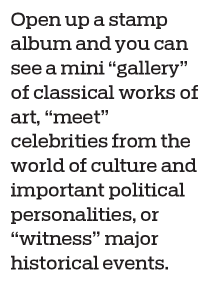Stamping an identity in a world before advent of computers

Understanding and finding out about the world is so easy in these days of the internet, when information about anything we want, and from anywhere we want, is literally at our fingertips.
So, cast your mind back over 40 years, when "computers" belonged mostly on television programs about the latest achievements in technology or some work of science fiction which was predicting (generally quite inaccurately) how people would live in the future, and television itself was limited to a very small number of channels for several hours a day.
Our horizons were much narrower in those days, and the technology was much more limited. However, even in those days, there was a very basic form of technology, based on a decidedly low-tech form of communication that literally presented the world to you at your fingertips.
That humble "technology" is the postage stamp, and it's been with us ever since my home country of the United Kingdom issued the world's very first one, known as the "Penny Black", in 1840.
Fast forward almost 140 years to Scotland in the late 1970s, where I, as a 6-year-old, was taking up this hobby when my father gave me his little stamp album containing his boyhood collection from the 1950s.
That was the moment I got hooked on this fascinating hobby, which remains one of my great interests to this day.
Every country in the world issues postage stamps, so the range of subjects presented on them ranges over an almost countless number of fields. Open up a stamp album and you can see a mini "gallery" of classical works of art, "meet" celebrities from the world of culture and important political personalities, or "witness" major historical events.
At a time when so much of the world seemed "closed" or "inaccessible" during the Cold War, stamps offered a window into those "mysterious" lands.
In fact, some of the first items which I ever saw from China (at a time when China was basically unknown to people in my country) were Chinese postage stamps from my father's stamp album. These were stamps issued in the mid-1950s on the theme of "exercises by radio", marking the 10th anniversary of New China in 1959, and commemorating the Asia-Pacific Peace Conference in Beijing in 1952.
Now my collection has expanded well beyond that first humble little album my father gave me in 1979, and it has taken me on a journey of discovery and learning.
I think that if you want to truly understand the role of the humble postage stamp, as well as the contribution it can make to improving international understanding, it can perfectly be summed in a very appropriate quote from Georgi Dimitrov (1882-1949), the first premier of socialist Bulgaria and a prominent leader of the international communist and workers' movement, who once said:"Postage stamps are the name card of a country."
Contact the writer at ian@chinadaily.com.cn






















